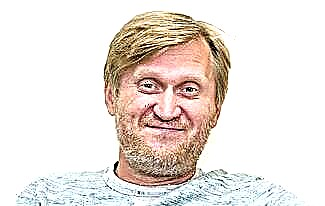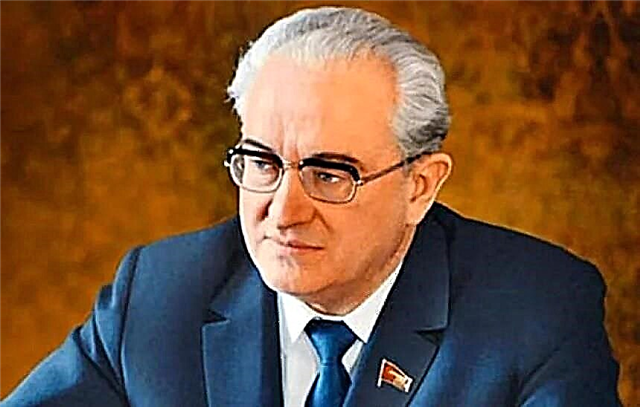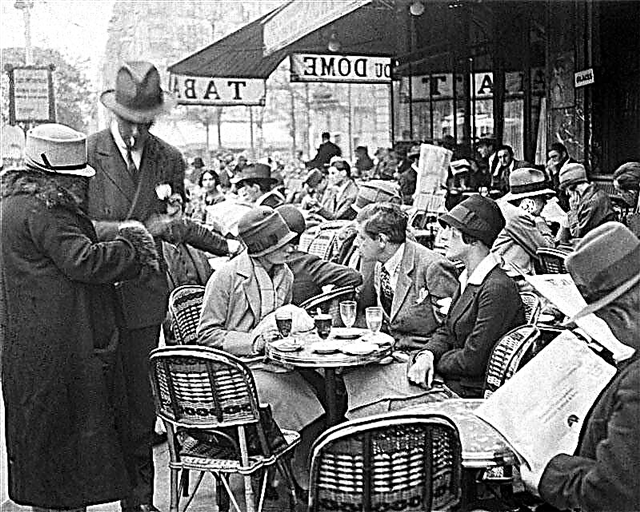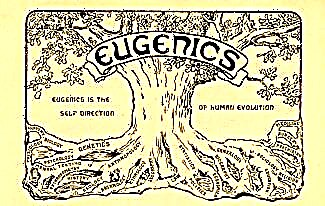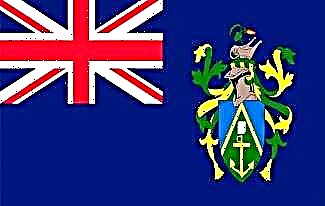Vyacheslav Mikhailovich Molotov (present Chairman of the Council of People's Commissars of the USSR (1930-1941), Minister of Foreign Affairs of the USSR (1939-1949) and (1953-1956). One of the top leaders of the CPSU from 1921 to 1957.
Molotov is unique in that he is one of the few political centenarians of the USSR who survived almost all the general secretaries. His life began under tsarist Russia and ended under Gorbachev.
The biography of Vyacheslav Molotov is intertwined with various interesting facts from his party and personal life.
So, before you is a short biography of Vyacheslav Molotov.

Biography of Vyacheslav Molotov
Vyacheslav Molotov was born on February 25 (March 9), 1890 in the city of Kukarka (Vyatka province). He grew up and was brought up in a wealthy family.
Vyacheslav's father, Mikhail Prokhorovich, was a philistine. Mother, Anna Yakovlevna, came from a merchant family.
In total, Molotov's parents had seven children.
Childhood and youth
From an early age, Vyacheslav Molotov showed creative abilities. During his school years, he learned to play the violin and also composed poems.
At the age of 12, the teenager entered the Kazan Real School, where he studied for 6 years.

At that time, many young people were keenly interested in revolutionary ideas. Molotov was not immune to such sentiments.
Soon, Vyacheslav became a member of the circle in which the works of Karl Marx were studied. It was during that period of his biography that the young man was imbued with Marxism, hating the tsarist regime.
Soon, the son of a wealthy merchant Viktor Tikhomirov became a close friend of Molotov, who decided to join the Bolsheviks in 1905. The very next year, Vyacheslav also joined the Bolshevik group.
In the summer of 1906, the guy is a member of the Russian Social Democratic Labor Party (RSDLP). Over time, Vyacheslav was arrested for underground revolutionary activities.
The court sentenced Molotov to three years of exile, which he was serving in Vologda. Once free, he entered the St. Petersburg Polytechnic Institute at the Faculty of Economics.
Every year, Vyacheslav was less and less interested in studying, as a result of which he completed his studies only until the 4th year, and did not receive a diploma. At that time, biographies, all his thoughts were occupied by the revolution.
Revolution
At the age of 22, Vyacheslav Molotov began working in the first legal Bolshevik edition of Pravda as a journalist. He soon met Joseph Dzhugashvili, who would later be known as Joseph Stalin.

On the eve of the First World War (1914-1918) Molotov went to Moscow.
There, the revolutionary continued to engage in propaganda activities, trying to find more and more like-minded people. Soon he was arrested and sent to Siberia, from where he managed to escape in 1916.
The following year, Vyacheslav Molotov was elected a deputy of the Executive Committee of the Petrograd Soviet and a member of the executive committee of the RSDLP (b).
Shortly before the October Revolution of 1917, under the leadership of Lenin, the politician harshly criticized the actions of the Provisional Government.
The Great Patriotic War
When the Bolsheviks came to power, Molotov was repeatedly entrusted with high positions. During the biography of 1930-1941. he was the chairman of the government, and in 1939 he also became the people's commissar for foreign affairs of the USSR.
A few years before the start of the Great Patriotic War (1941-1945), the top leadership of the Soviet Union understood that the war would definitely begin.

The main task at that time was not to avoid an attack by Nazi Germany, but to gain as much time as possible to prepare for war. When Hitler's Wehrmacht occupied Poland, it remained to determine how the Nazis would behave further.
The first step towards negotiations with Germany was the Molotov-Ribbentrop Pact: a non-aggression pact between Germany and the USSR, concluded in August 1939.
Thanks to the pact, the Great Patriotic War began only 2 years after the signing of the agreement, and not earlier. This allowed the leadership of the USSR to prepare for it as much as possible.
In November 1940, Vyacheslav Molotov went to Berlin, where he met with Hitler to understand the intentions of Germany and the participants in the Pact of Three.
The negotiations of the Russian Foreign Minister with the Fuhrer and Ribbentrop did not lead to any compromise. The USSR refused to join the "Triple Pact".

In May 1941, Molotov was relieved of his post as head of the Council of People's Commissars, since it was difficult for him to cope with two duties at the same time. As a result, the new body was headed by Stalin, and Vyacheslav Mikhailovich became his deputy.
In the early morning of June 22, 1941, Germany attacked the USSR. On the same day, Vyacheslav Molotov, by order of Stalin, appeared on the radio in front of his compatriots.
The minister briefly reported on the current situation to the Soviet people and at the end of his speech uttered his famous phrase: “Our cause is just. The enemy will be defeated. Victory will be ours".
Last years
When Nikita Khrushchev came to power, he demanded that Molotov be expelled from the CPSU for the "lawlessness committed under Stalin." As a result, in 1963 the politician was retired.
The resignation became one of the most painful episodes in the biography of Vyacheslav Molotov. He repeatedly wrote letters to senior management, in which he asked to be reinstated in his post. However, all his requests did not give any result.
Molotov spent his last years at his dacha, built in the small village of Zhukovka. According to some sources, he lived with his wife on a pension of 300 rubles.
Personal life
With his future wife, Polina Zhemchuzhina, Vyacheslav Molotov met in 1921. From that moment on, the couple never parted.
The only daughter, Svetlana, was born in the Molotov family.
The couple loved each other and lived in perfect harmony. The family idyll continued until the moment when Polina was arrested in 1949.
When at the party plenum the wife of the People's Commissar was removed from the candidates for membership in the Central Committee, Molotov, unlike others who voted for, was the only one to abstain from voting.

Shortly before the arrest by Zhemchuzhina, the couple fictitiously parted and parted. This was a great test for Vyacheslav Mikhailovich, who passionately loved his wife.
Immediately after Stalin's death in March 1953, during the days of his funeral, Polina was released from prison by Beria's personal decree. After that, the woman was taken to Moscow.
The politician was called a man with an "iron bottom" for his perseverance and scrupulousness. An interesting fact is that Winston Churchill noted that Molotov possessed fantastic self-control and scarcity of emotions even in the most critical situations.
Death
Over the years of his biography, Molotov experienced 7 heart attacks. However, this did not prevent him from living a long and eventful life.
Vyacheslav Mikhailovich Molotov died on November 8, 1986 at the age of 96. After his death, the people's commissar's savings book was discovered, on which there were 500 rubles.
Photo by Vyacheslav Molotov




